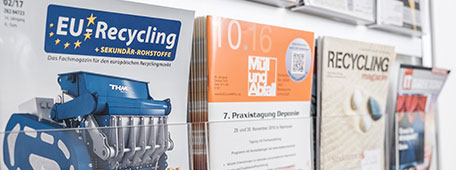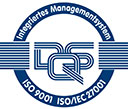Waste management 4.0 – utilizing potential
Waste management processes today are characterized by a large amount of bureaucratic work Converting to electronic processes offers significant potential savings. Cloud solutions can optimize processes, create better legal security, and improve service.
Waste management has changed greatly over the years. Linear disposal processes are a thing of the past; instead, waste disposal functions like a complex cycle. Waste and recyclable materials must be carefully separated and raw materials recycled, while other wastes are disposed of properly.
The administrative work this requires has ballooned due to increasing legal regulation. Waste producers must apply individually for disposal to the responsible agency for all commercial waste materials that are hazardous and require certification. Every transportation must also have a dispatch note signed by all parties involved in the waste disposal process. Even more paper is required if waste needs to be transported across international borders.
Legal security and cost efficiency are a must
With all of this bureaucracy, legal security is highly important to waste transportation companies. The producer of the waste materials is responsible until they can provide certification of proper disposal, but the transporter or disposal company can also be held accountable if errors occur. Consistent, cost-efficient, and transparent material flow management is indispensable for disposing of wastes inexpensively and monetizing recyclables.
Many waste transportation companies still use paper, phone, and Excel-based processes. This manual processing is work-intensive and error-prone. Most invoices are still printed out, sent by mail, and then typed into different IT systems for further processing. With every manual work step and every media disruption, the danger of typos increases. Solutions that digitize the entire process are more efficient, avoiding sources of error and providing faster processing.
Digitize and simplify processes
Simply switching over from paper to electronic invoice processing can significantly reduce costs. In addition, online communication makes the exchange of information and documents quicker and simpler.
Further processes can also be optimized through a single joint and standardized data platform for all waste disposal companies. Currently, there are roughly 50 different interfaces relevant to waste management. Even if just a few of these are used in any one disposal process, it is almost impossible to maintain all of them. A central, uniform data hub means there is only one interface to manage: the platform connection. Data is recorded directly as it is produced. Once in the system, it can be supplemented or edited later on with no media disruptions. This avoids typos and saves a large amount of work time.
To ensure efficiency and sustainability and utilize economic potential, companies must also switch over to waste management 4.0 in the near future – meaning complete digital transformation of all processes along the disposal chain.
Cloud generates potential savings
However, many waste management companies are delaying their digital transformations – for fear of all the IT work involved and associated costs, as well as due to security concerns. Software as a service solutions are a simple, secure, and cost-efficient way to handle these issues. Cloud-based platforms optimally tailored to the needs of waste management require no local installation or preliminary investment, but instead can be accessed from any device with a web browser. This makes them scalable and flexibly accessible to users. They don’t replace current ERP systems, but rather build upon them. Companies can continue to use their own programs, while adding an additional level on top.
Conclusion
Companies that use digital platforms and electronic data processing can optimize their processes across the company and even across the country, save time and resources, and improve transparency. This helps any company involved in waste management secure its position on the highly competitive disposal industry market.

































